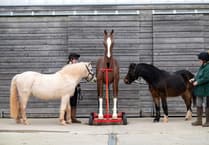A LEADING councillor has expressed caution over tentative Government proposals to clamp down on anti-social behaviour on Dartmoor.
The Department for Environment, Food and Rural Affairs (Defra) is mulling over a series of suggestions which could tackle problems caused by the invasion of tourists following the easing of Covid-19 lockdown restrictions more than a year ago.
Visitors flocked to Dartmoor after the Government allowed people to travel for the first time since the pandemic struck in March 2020.
That infusion of visitors, particularly during a white winter on Dartmoor, resulted in massive traffic queues, road blocks caused by badly-parked vehicles and claims of damage to farmers’ property.
In one incident, police had to close a road through Dartmoor to traffic to enable a doctor to deliver Covid-19 jabs to a care home.
Now Defra is considering a raft of measures which could include Public Spaces Protection Orders being imposed on parts of the moor or fixed penalty tickets issued for infringement of byelaws. They would also examine the possibility of traffic orders on some roads to control the amount of traffic using them.
The idea comes following Dartmoor National Park’s consultation last year over the tightening up of existing byelaws, which led to a wave of protests.
Defra’s latest ideas have been put forward on the back of a consultation document drawn up by independent analyst Julian Glover, which aims to make the tourism industry more sustainable.
One of the proposals by Glover suggested creating a new National Landscapes Service to oversee national parks, which met with opposition locally. However, the Government in its response said it was not in favour of creating a new public body at great public expense and disruption to the important work that was already being done by the national park authorities across the country.
Responding to some of the detail Devon County councillor Philip Sanders, who represents Yelverton Rural and who is a member of Dartmoor National Park Authority, said the authority was more interested in educating members of the public over their behaviour on the moor than prosecuting them.
He said: ‘We have always made it clear that we don’t want to prosecute people, or tell them off or punish them. I’ve been a voluntary ranger for 50 years and I can remember just one prosecution.
‘We’d much rather educate people about what they should be doing on Dartmoor. We want people to visit the moor and enjoy it.’
Defra said: ‘Since the review was published, rangers in protected landscapes have observed increased visitor numbers and an increase in anti-social and hostile behaviour.
‘In response, Natural England has revised the Countryside Code, and run a communications campaign to improve people’s understanding of the countryside and promote socially and environmentally responsible behaviours.
‘However, providing visitors with clearer information has not been sufficient to fully address these ongoing issues.
‘We are therefore considering making a greater range of enforcement powers available to national park authorities and the Broads Authority to help manage visitor pressures and make national parks a more pleasant and safe place to live and visit.’
It adds they have become ‘increasingly aware’ of ‘excessive use of off-road motor vehicles on some unsealed routes.
‘This can result in impacts on local wildlife, the special qualities of an area e.g., tranquillity, and make the route less accessible for other users such as those on foot, bicycles, horseback, or in vehicles used by disabled people. In protected landscapes, these impacts could undermine the statutory purposes of the area.
‘We are also aware that these unsealed routes often provide essential vehicular access for local residents and businesses, and recognise that many people enjoy using motor vehicles responsibly on green lanes without causing damage or disturbance. Vulnerable groups such as disabled or elderly people are also likely to be particularly reliant on vehicular access in rural areas including via community transport.
‘We therefore would like to explore the options available for protecting our green lanes while maintaining most public and private access rights, particularly for residents or businesses. This could be achieved by giving greater discretion for national park authorities and local highway authorities to use existing powers to restrict use on a case-by-case basis.
‘Alternatively, the Government could consider restricting the use of certain motor vehicles on unsealed roads through legislation, but only if this could carefully balance the needs of all users including motorised vehicle users, horse riders, cyclists and walkers, whilst also protecting private access rights.
‘We will also continue to work to manage visitor pressures through visitor dispersal. A key objective in the Government’s Tourism Recovery Plan is for visitor spending to grow year on year in every nation and region of the UK, not only within but beyond the usual tourist “hotspots” to smaller, lesser-known destinations — including the lesser-visited protected landscapes.’




